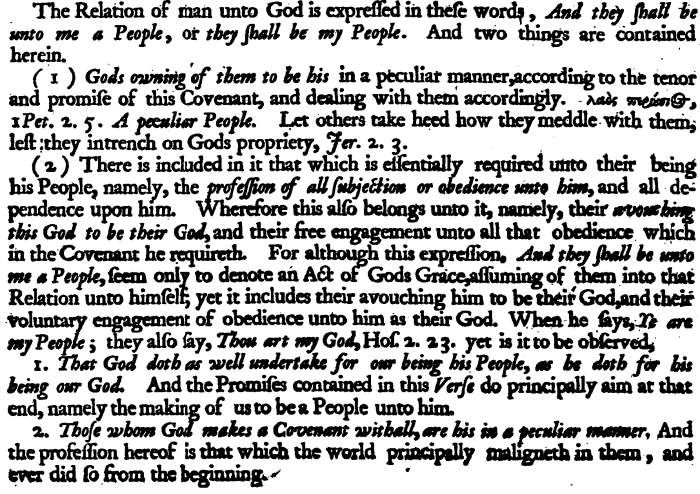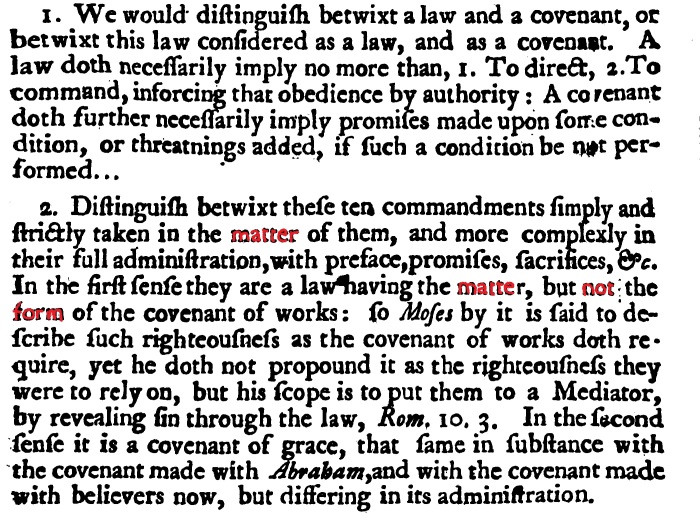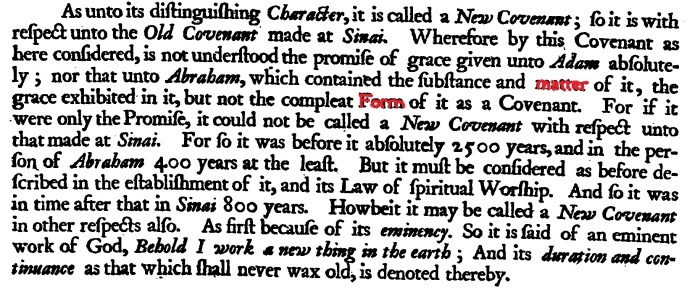Before reading this post, please see here.
The Paedobaptist Argument
One of the most common arguments for the practice of the baptism of infants is the appeal to the phrase “I will be a God to you and to your children.” The argument is that the covenant of grace is repeatedly declared in these terms, or terms similar to it, such as “I will be their God, and they shall be my people.” Therefore apart from God’s removal of this promise, it persists.
Passages in the New Testament are appealed to as a confirmation of the persistence of this promise. For example, Peter declared in Acts 2:39 that “The promise is for you and for your children.” Jesus blessed children and said that “of such is the kingdom of heaven.” Households were baptized in the book of Acts. Paul declared that the children of believers are “holy” in 1 Corinthians 7 and taught children to obey their parents “in the Lord” in Ephesians 6.
The argument is sometimes presented to say that the substance of the covenant of grace is summed up in the phrase “I will be a God to you and to your children.” For example, in this post, Dr. R. Scott Clark states,
The substance of the covenant, i.e., that without which there is no covenant, that which is of the essence of the covenant is the promise in v. 7 [Genesis 17:7]: “to be Elohim (God) to you and to your offspring after you.” That promise, “and I will be their God” is repeated after the land promise in v. 8.
[Side note: Dr. Clark, has a much better definition of the substance of the covenant, limiting it to justification and sanctification in this post.]
By equating the substance of the covenant with this promise, the Reformed paedobaptist is able to say that though there are numerous outward changes in the transition from the old covenant to the new, this promise remains the same. It is the substance. It is what the covenant is, in itself. For what could be more gracious than for God to be the covenant-God of a people after the fall? The denier of infant baptism, say they, destroys the unity of the covenant throughout history and disinherits those whom God himself has claimed, the children of believers.
The Reformed Baptist Critique
Allow me to interact with this argument, which I have summarized. Elsewhere you can find ample reading or listening in defense of this particular piece of the grounds of infant baptism.
Counter-argument 1: A Generic Covenant Formula
The promise “I will be their God, and they will be my people” is a generic covenant formula and carries in itself no specific details regarding the promises God provides in covenant, or the obedience he requires in covenant. It cannot, therefore, be correlated to, or equated with, automatically, the covenant of grace which has specific promises and precepts.
In John Owen’s comments on Hebrews 8’s quotation of Jeremiah 31, he discusses this promise. Owen notes that it is is a general phrase for any covenant between God and a people.

Owen argues that this is merely a general covenantal formula because Jeremiah 31 invokes this promise in the context of the new covenant not being like the old covenant. For Owen, the old and new covenants are substantially distinct, but this phrase is used in reference to both. Therefore, this phrase cannot be used to equate two covenants, automatically. Owen notes that the specifics of the covenant must be considered. He comments, immediately after the previous quote:

So, when one finds a formula such as this, one must consider (1) the specific grounds upon which the covenant is founded and (2) that which God specifically promises to his covenant people as well as the response which he specifically requires of them (i.e., the “mutual actings”). Owen identifies the grounds of the new covenant in the mediatorial work of Jesus Christ. And he describes the “mutual actings” in more detail here:

The focus and conclusion of this consideration is simply that the phrase “I will be their God, and they will be my people” is a generic covenant formula whose instances in the Scriptures cannot be equated automatically with one another apart from proof that the specific grounds of the covenant, the specific parties of the covenant, and the specific precepts and promises of the covenant are actually the same.
The Westminster Confession (as well as 2LCF) affirms the validity of good and necessary consequences. Consequences are necessary conclusions from clear and certain premises. The premises necessitate the conclusion. Covenants are not natural, but supernatural, that is, covenants between God and man exist only when God initiates them, and are what they are based only on what God makes them to be. Considering, therefore, that this formula is generic, not specific, then it follows that there is no necessity in the phrase itself that would permit us to conclude, theologically, the specific content of the generic phrase apart from additional context. Nor is there a sufficient necessity in the phrase itself to equate it with any other covenant, even if the same phrase, or a similar one, appears elsewhere. One would have to align all the specifics.
Counter-argument 2: A Specific Covenant Promise
Proceeding under the notion that generic covenant formulae must be explained by their specific covenant details, we can consider the argument for infant baptism that appeals to the covenant promise in Genesis 17:7, “I will be a God to you and to your children.”
This promise has specific, unique, individual referents. It is a promise to Abraham himself and his descendants, according to the flesh. Consider the simple grammar of Genesis 17:7.
And I will establish my covenant between me and you (2nd person masculine singular) and your (2nd person masculine singular) offspring after you (2nd person masculine singular) throughout their generations for an everlasting covenant, to be God to you (2nd person masculine singular) and to your (2nd person masculine singular) offspring after you (2nd person masculine singular).
The parties are specified clearly–Abraham and his offspring according to flesh (his descendants after him). What are the specific promises? These descendants, according to the flesh, will multiply and possess Canaan. And from Abraham’s descendants, according to the flesh, will be born the one who blesses the nations. This means that Abraham’s offspring, by virtue of being his offspring, possess:
- The land of Canaan
- A relation according to the flesh to the one who will bless the nations
God placed a specific demand on these specific parties, a demand which must be kept or these specific promises will be lost. Abraham and his descendants, according to the flesh, must keep the covenant or they will be disinherited on an individual basis (Genesis 17:10, 14). God will guarantee that the covenant does not fail, corporately (Genesis 15), but individuals and families can be cut off and disinherited (such as the wilderness generation).
Considering the specific details of this covenant, on what ground do we connect these specific details with any other covenant? Is there another covenant made with Abraham and his offspring, according to the flesh, which they must keep or they will be disinherited? This is where numerous parties distinguish themselves.
- Option 1: The Westminster Confession
The Westminster Confession recasts the details of Genesis 17 and abstracts the specifics of Abraham and his descendants according to the flesh to believers and their children. A believer can insert their own name into the second person masculine singular referents of Genesis 17:7. Certainly, they believe they have exegetical reason to do so, as mentioned at the beginning of this post. Nevertheless, the result is that in such a view the Abrahamic, Mosaic, and new covenants are the same covenant, the covenant of grace, made with believers and their children, requiring only a consequent obedience of gratitude, and being threatened only with fatherly discipline and chastisement.
- Option 2: Formal Republication
Others in Reformed theology follow the previous option, except the Mosaic covenant is distinct in substance from the Abrahamic covenant and new covenant (like Owen, above). Such persons agree that the Mosaic covenant is made with the same parties as the Abrahamic and new covenants, but it dealt only with life in Canaan and must be obeyed and kept in order to be enjoyed. The end result is that the covenant of grace is made with believers and their children now, as it was then.
- Option 3: Reformed (Particular) Baptist, or at least my position and the position of most seventeenth-century Particular Baptists
When we consider the specifics of Genesis 17 (and from Genesis 12 up to that point), we find that the Abrahamic and Mosaic covenants are made with the same parties (Abraham and his offspring according to the flesh), with the same promises (blessed life in Canaan and the birth of the one who blesses the nations), with the same precepts (moral and ceremonial obedience), and the same threats ( qualified disinheritance).
The Abrahamic and Mosaic covenants are not the new covenant, but carry in them the new covenant, in at least two ways. First and foremost, God promised that the one who blesses the nations would be born from their midst. This means that the old covenant(s) can never be considered as divested of a connection to Christ Jesus and his covenant. From the first moment the Abrahamic covenant was introduced (Genesis 12), this was the purpose. Second, God designed Israel from the ground up to be a typical foreshadowing and preparation for the birth of Christ so that his mission would make sense when he came. Again, this means that the old covenant(s) can never be detached from pointing to Christ and preparing the world for him. Positively, the gospel of Christ, and therefore the new covenant, were woven into the fabric of everything Israel was, and did.
Notwithstanding the connection the old covenant(s) have to Christ, they are not the new covenant. Their parties, promises, and precepts are distinct. Christ rejected Abrahamic paternity as sufficient grounds for inclusion in his kingdom, he rejected the idea that Canaan would be the realm of his kingdom, and he rejected the continuance of the Abrahamic/Mosaic laws.
The new covenant is the blessing for the nations, a people born from above. It forgives sins and perfects the conscience. It grants an everlasting inheritance in the new creation. It enables its people to believe and obey. It is for Jew and Greek, all who call on the name of the Lord.
The question at hand, though, is this: considering the details of Genesis 17:7, can the phrase “I will be God to you and to your offspring after you” be abstracted to “believers and their children”? Can it be equated with the new covenant?
Many would appeal to Romans 4 and Galatians 3 at this point. Those passages deserve separate treatment. For now, however, if one does appeal to Genesis 17:7, and if it is the pattern, the paradigm, for the covenant of grace, then several questions are raised:
- Do the children of believers belong to the covenant according to the flesh, as the descendants of Abraham after him did?
- If yes, does this last their whole life? Or, does their continuance in the covenant transfer at some point from the relation they have to their parents to their individual relation to Christ the head of the covenant?
- If yes, does the covenant extend to the third and fourth generation and beyond, whether any in that generation believe? If it runs in the flesh, it runs in the flesh. Does a wilderness generation disinherit its children?
- If yes, are the children instructed that the covenant is of no advantage to them unless they believe its promises? (And at that point, how are they different from the children of unbelievers in such a view?)
- Does the threat of disinheritance connected with circumcision apply to them if baptism is the new outward form of the same covenantal ordinance and paradigm established in Genesis 17?
- Do the children of believers belong to the covenant according to the Spirit, as believers are described to be?
- If yes, why do some fall away?
- If no, then you hold that they are the children of the covenant only according to the flesh and the previous set of questions apply.
- If no, how does that fit with the fact that all of Abraham’s descendants, after Ishmael, had a right to the promises of the covenant, but your children do not have a right to the promises because they do not belong to the covenant inwardly?
Genesis 17 declares a definite promise for the offspring of Abraham. It is theirs. All of his descendants have a right to it and in it. Based on this fact, the foregoing sets of questions press the issue of whether the covenant is definite or indefinite to the children of believers, an issue of disagreement among paedobaptists.
To sum up the argument, too many appeals to Genesis 17:7 are vague and general appeals to something quite specific. And given that paedobaptism is practiced as religious worship unto God, it requires a more careful foundation. A conscience desiring to worship God aright must have answers to these questions before acting. Do the specifics of this verse apply to me and my child? Can I substitute myself and my children into Genesis 17:7?
Counter-argument 3: The Problem of Faithfulness and the Eschaton
It is a mistake to equate the substance of the covenant of grace with the promise “I will be God to you and your children” because such a promise will not extend into the consummation of all things (the eschaton). Revelation 21:3 assures us of the blessed comfort that God will be our God, and we will be his people, forever. But, following Owen’s method, what are the specifics of this promise?
The parties are clear. The elect of God alone behold the glory of God in the face of Jesus Christ. So, in eternity will the promise persist that God is a God to us and our children? No, the promise that persists, the substance of the covenant that lasts into the eschaton, is that God will be merciful unto us and remember our sins no more (Jeremiah 31:31-34). Certainly, by God’s grace some of our children will join us in that precious covenant promise. And God will be their God, but not because of any relation to us.
If we say that the promise that God will be a God to us and our children will persist into the consummation, then we must ask, is God unfaithful? We know that not all our children will be there. If the promises of the covenant depend on God’s sovereign grace and faithfulness, and God cannot lie or fail, and yet some of those to whom he has promised to be God fail to behold his glory in the face of his Son, is God unfaithful?
If an appeal is made to Paul’s discussion of Israel’s faithful remnant as evidence of God’s faithfulness, then one must be willing to say that God is a God to us and our children, so long as we persevere in the covenant, and God has not promised to preserve us all. And therefore, at the end one can say that yes, the promise to be God to us and our children lasts into the eschaton, because God never promised to save them all and the unfaithful ones have already been cut off. Now, such a position involves many preceding arguments and/or suppositions with which I strongly disagree. But I regard it as an unavoidable dilemma (and conclusion) of making the formula “I will be a God to you and your children” the substance of the covenant of grace.
In conclusion, when someone appeals to the formula, “I will be their God, and they will be my people,” or the formula, “I will be a God to you, and to your offspring after you,” it is necessary that the specifics of these general formulas be investigated and explained carefully.
- This is a general formula, what are its specifics?
- What are the grounds of this covenant?
- Who are the parties?
- What does God promise?
- What does God require?
I will conclude with more of Owen’s comments on the precious promise of Jeremiah 31:33 quoted in Hebrews 8:10, that God will be our covenant God, and we will be his covenant people.






























